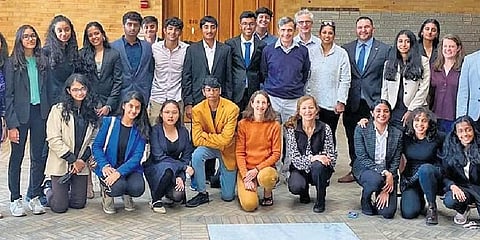

CHENNAI: No discussion about India goes without mentioning the glaring urban-rural divide, in terms of lifestyle, outlook, and quality of education. Manav Subodh, co-founder of 1 Million for 1 Billion, an organisation focused on nurturing social innovation and leadership skills, came up with The Purpose Academy, a scheme through which he hopes to address this.
“The Purpose Academy was conceptualised to address the growing divide between students in affluent schools, who look at life through an aspirational lens in terms of opportunities and growth, to the India of the grassroots, where 65-70 percent of the country lives,” he said. A select number of students are then invited to present their project at UC Berkeley and Silicon Valley, California, where they go through a fiveday immersion programme with other mentors.
This includes a trip through UC Berkeley and Stanford University (even attending a class at Berkeley), a full day workshop, ‘Pitching the Silcon Valley Way’ by Henrik Scheel, founder, Startup Experience, a visit to the Adobe office in San Francisco, and an interactive chat with Aayush Phumbhra, co-founder of Chegg, a $12 billion company listed by NYSE.
The programme is designed to give students an immersive experience of India’s grassroots. “This is not like going on a village trip, where we all go around taking pictures and come back feeling good about having taken up some volunteering activity. You get a real taste of India’s interiors when you attempt to solve a person’s problem,” he said. Among the students who presented their project was Sharada Gopalakrishnan, a class 11 student at Alpha International School, Chennai. Sharada’a project, Mritsa, focused on helping farmers move from chemicalintensive farming to zero-budget natural farming, and she worked along with Amrutha Potlurri, another student.
“I will take away memories of the places we saw — namely the cities and campuses of San Francisco, Berkeley, UCB, Stanford, Sausalito, etc. I will also remember Mark’s pithy maxims, advice, and wisdom very vividly. My key learnings were about public speaking, career choices, and working with people. I learned the true importance of networking and putting yourself out there. Nothing worthwhile comes without throwing your heart through a brick wall.
I’ve learned that if you want something you need to elbow your way through and speak up to get it,” shared Sharada. The project presented students in elite urban schools with problems faced in rural India, as a problem-solving experiment using the UC Berkeley framework of problem-solving and entrepreneurship. Essentially, it demanded that the students come out of their bubble and understand the lives of people outside their affluent circles.
And through this, they learn about the village ecosystem, and how several dynamics shape out. “We take them through a structured process of solving a problem and ask them to create solutions. In the process, these students end up getting introduced to the hinterlands of India,” added Manav. The event was organised in partnership with the College of Engineering, SCET, at UC Berkeley, and the Innovation Acceleration Group that enables bright young minds to solve complex world problems.
“The memories that stood out the most were definitely with the group and the activities, especially the boat rides, walks, and party bus! Our group already had a lot of practice in preparation for UC Berkeley, and each presentation and pitch became more refined until the final day in which I truly believe we had our best showing.
The biggest learning was how to get hands-on and work with a larger team. It’s also the part I enjoyed the most. Creating a solution is relatively easy compared to actually making it work out.”
-Krish Gangaraju Class 12, The International School, Bengaluru. Project: Auxilla, focused on rural healthcare
“Presenting at Adobe was an opportunity I would have not gotten otherwise, which is why I feel that it was great, especially to get outside my comfort zone and get a third person (experienced) opinion on my project.The way an idea is presented matters a lot, it’s not only the content, it’s also the presentation. Communication plays a key role in spreading your message. How to convert an idea into something much bigger, which can be applied in real life.”
- Syonaa Nair Narsee Monjee College, Mumbai. Project: Kalamkari Meraki, focused on artisans.